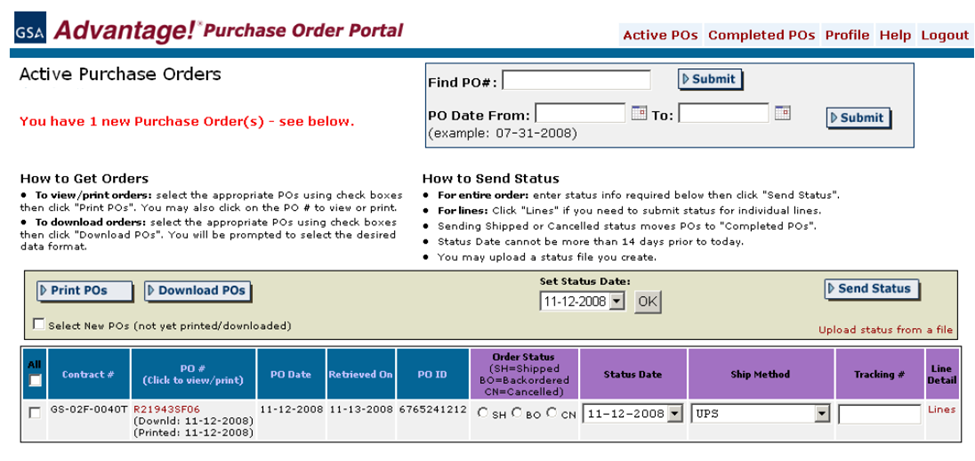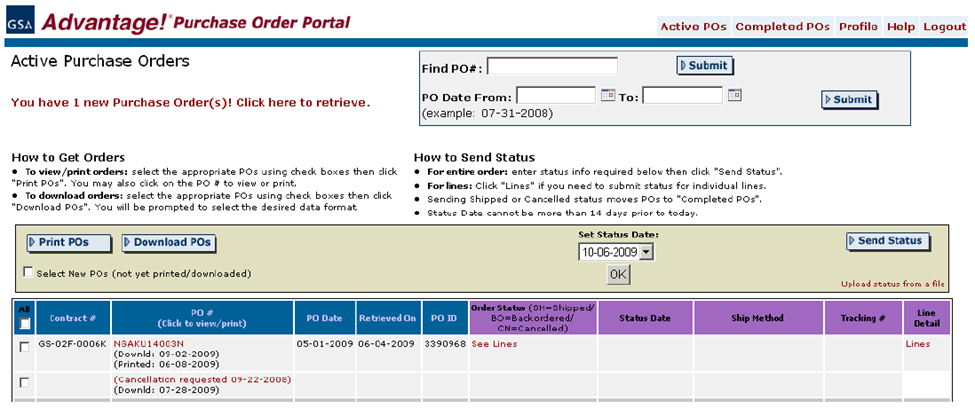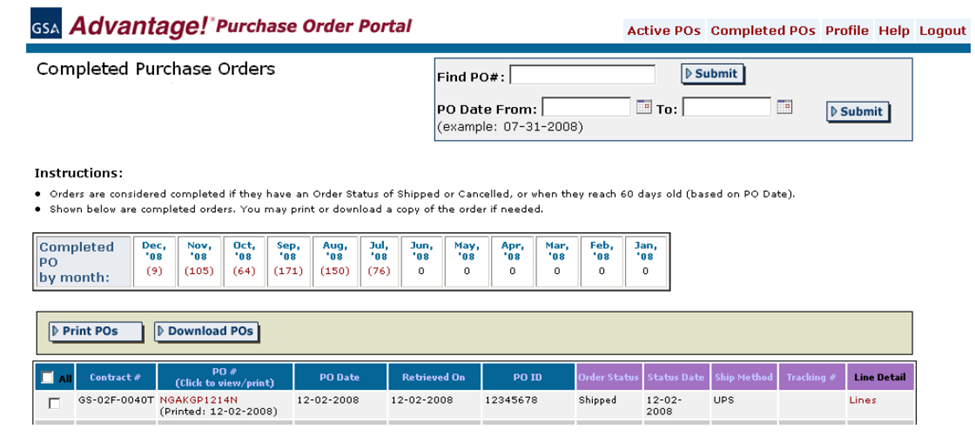A Guide to the GSA Purchase Order (PO) Portal
Government Business Development | 8 Min Read
One of the most unique and useful parts of being a GSA Schedule contractor is access to tools and resources that allow you to conduct extensive market research, find and bid on opportunities, and sell your products directly to government customers. For example, on GSA Advantage!, you can list and sell your products to government agencies just like vendors can do on Amazon with commercial customers.
Once a buyer chooses to order one of your items, it's just as important to know how to handle the backend of the orders. This is where the Purchase Order (PO) Portal comes in. When a government buyer places an order through GSA Advantage!, contractors can immediately access the orders and frequently update the order status. In this blog, we’re going to cover what you need to know about the PO Portal, from registration, to order status, and the reporting process for your orders.
What is GSA Advantage?
First, let’s delve a little bit into what GSA Advantage! is, and how contractors/agencies use it. GSA Advantage! is an online ordering system that provides government agencies access to thousands of GSA contractors offering millions of products and services. Federal users may browse, conduct market research, and purchase directly from GSA Advantage!. Government entities worldwide use GSA Advantage!, and it is now also available to thousands of state and local government entities to purchase products and services.
Through GSA Advantage!, government buyers have a one-stop shop to buy products or services provided through the GSA Schedules Program. Any agency purchasing through this program can have confidence that the prices are "fair and reasonable" and the "best value."
Since contractors can accept orders straight from GSA Advantage!, they also need to understand how to manage their orders and update their status, something that GSA is really cracking down on.
What is the GSA Purchase Order Portal?
The GSA Purchase Order Portal provides GSA contractors with easy and immediate access to orders placed through GSA's Advantage and eBuy systems. In this portal, GSA Schedule holders must understand how to manage the orders they receive and what to do if any issues occur.
The PO Portal also allows you to give the status of your orders. This status is provided to the ordering customer. Providing status keeps customers informed and reduces calls to you about the order status. This article will explore multiple scenarios and show how to handle each one effectively, so you can use the PO Portal to your advantage.
How Do You Register on the PO Portal?
If you still need to register on PO Portal, any email notice of new orders will contain a link to register, and you will also receive an initial email inviting you to register. Once you complete your registration, you can access the PO Portal and your orders. It’s important to note that access to the PO Portal is limited to those individuals whose email address has been identified in your GSA Advantage! electronic catalog file.
You Received a GSA Advantage! Order--Now What?
Congratulations, you've just received your first order! While these are exciting times, it can also cause many contractors to have questions, and some may wonder what the next steps are. First orders generated by GSA Advantage! can be accessed by logging into the PO Portal at www.poportal.gsa.gov.
This website allows you to view or print your orders in PDF format, or you may download your orders in Excel (.xls), text (.txt), CXML, or PDF. You may also receive your orders directly (without using the PO Portal) in an XML or EDI format. It’s crucial to note that orders will not be sent to the PO Portal for contractors currently receiving orders via EDI or XML.
Once you have located your orders, you must identify if you can fulfill the orders, meaning you have the required inventory and meet the date the purchaser needs the products or services. Government buyers will have an order history page to manage and check their order status.
Any time you change the order status, your customer receives an email. Just like you want to know where a package is once you order it from Amazon or another retail site, government customers want to know what's happening with their purchases. Since April 2022, GSA has required contractors to report order status properly or risk suspension.
Active Purchase Orders
If you have an order that has been recently retrieved, it’s less than or equal to 60 days old, and have not been shipped or cancelled, it will appear in the “Active Purchase Orders” tab. You can view all active purchase orders in the PO Portal as seen below.

Retrieving Purchase Orders
There are two ways to retrieve new purchase orders. One is at login—upon logging in, you will immediately be prompted to retrieve your new orders. Once you click “retrieve,” they will be added to the active orders page as seen above. You can also retrieve and download new orders straight from the “Active Purchase Orders” screen as seen below.

Reporting Process for the Order
Throughout the PO process, you must keep the purchaser in the loop about their order. This is done by providing status updates, as mentioned in the previous paragraph. These updates can take many forms depending on your process stage.
Some status updates are self-explanatory, such as "shipped' meaning the product is in transit to its destination. Another update is "canceled." This can happen for a few reasons, such as you don't have the required inventory to fill the order (you should try to do so before acknowledging the order) or maybe the buyer no longer needs the product. It's crucial to note that if you need to cancel an already accepted order, you must contact the Contracting Officer (CO) responsible for the contract so they can submit a cancelation request. Only then can you cancel an acknowledged order in the PO Portal.
Another common occurrence could be a "back-ordered" item if you cannot partially fill an order. A GSA CO will review and either accept or reject your request. If accepted, the status on the PO will be updated, and then you can acknowledge the order and enter shipping information. You can also provide a status update by line or by order meaning you give the status for the entire order or each line item, as some may have differing delivery dates.
Status by order will look like this:

Status by line will look like this:

What Happens After a Purchase Order is Completed?
It's essential to make sure your order status remains up to date. A completed order is designated as shipped, canceled, or older than 60 days. Your submission of order status using the PO Portal updates customer order history and keeps customers in the know about their order status and will inevitably reduce phone calls concerning their items.
We highly recommend that you utilize order status, GSA is really starting to keep tabs on who is accurately and consistently updating status. If you do not have any completed orders, a message "You have no completed orders" will appear. Completed orders can be printed or downloaded.

Navigating GSA Resources and Tools
The Purchase Order Portal is crucial to your success as a GSA contractor. It's essential to track your orders and ensure your GSA Advantage! catalog is updated so you can gain new and regular government customers. It's also an important part of complying with GSA rules and regulations.
If you want to learn more about the PO Portal, GSA has training on how to use the Portal. If you want to learn more about keeping your GSA Advantage! catalog updated and best practices, you can check out our blogs, Schedule Input Program (SIP) Training for GSA Contractors, and GSA Advantage! Best Practices.
If you need help uploading or updating your GSA Advantage! catalog or navigating any of GSA’s other sites and GSA Schedule regulations, one of our consultants would be happy to assist.
About Stephen Denby
Stephen Denby is a Proposal Writer at The Winvale Group focusing on government contracting and federal acquisition opportunities for businesses. He is a native of Charlottesville, Virginia and graduated from James Madison University with his Bachelor of Science in Public Policy and Public Administration.


.jpg)



